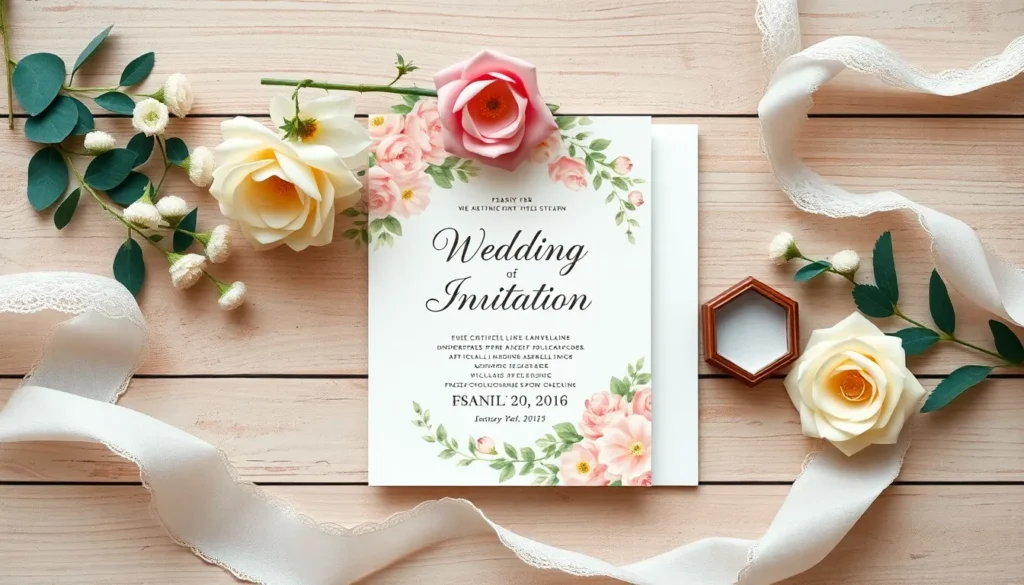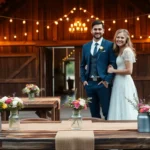Planning your perfect wedding involves countless decisions but few carry as much weight as your invitation wording. We know the pressure you’re feeling – these few carefully chosen words will set the tone for your entire celebration and give guests their first glimpse into your special day.
We’ve gathered the most elegant and creative wedding invitation wording ideas to help you strike the perfect balance between tradition and personality. Whether you’re planning a formal black-tie affair or an intimate backyard celebration we’ll guide you through options that capture your unique love story.
From classic formal phrases to modern casual approaches we’ve curated examples that work for every style and budget. We’ll show you how to navigate tricky family dynamics handle divorced parents and include stepparents gracefully. Our comprehensive guide ensures your invitations reflect both proper etiquette and your authentic voice making them as memorable as your wedding day itself.
Traditional Wedding Invitation Wording Ideas for Classic Ceremonies
Traditional wedding invitation wording provides timeless elegance that honors long-standing customs while maintaining sophisticated appeal. We’ve compiled classic phrasing options that create memorable first impressions for your formal celebration.
Formal Church Wedding Wording
Religious ceremonies require respectful language that acknowledges the sacred nature of your union. Traditional church wedding invitations typically include formal elements like “request the honor of your presence” rather than casual alternatives.
Here are proven formal church wedding wording examples:
- Honor the sacred setting by using “request the honor of your presence at the marriage of their daughter” when parents host the ceremony
- Include religious elements such as “as they unite in holy matrimony” or “in Christian marriage” to reflect your faith tradition
- Specify the ceremony location with full church name and address: “Saint Mary’s Catholic Church, 123 Main Street, Anytown, State”
- Add blessing language like “with God’s blessing” or “in the presence of God and family” for deeper spiritual connection
| Formal Element | Traditional Phrasing |
|---|---|
| Opening | “Mr. and Mrs. John Smith request the honor of your presence” |
| Union Description | “at the marriage of their daughter” |
| Religious Context | “in holy matrimony” |
| Location Format | “Full Church Name with Complete Address” |
Traditional Reception Card Language
Reception cards accompany ceremony invitations when celebrations occur at different venues. Classic reception wording maintains formality while providing essential celebration details.
Essential traditional reception card elements include:
- Opening phrases like “Reception to follow” or “Dinner and dancing to follow immediately after the ceremony”
- Venue specifications with complete location name and address for guest convenience
- Time details using formal language such as “at six o’clock in the evening” rather than “6:00 PM”
- Dress code indicators through subtle phrases like “black tie requested” or “cocktail attire suggested”
Standard reception card formats follow this structure:
“Reception immediately following the ceremony
The Country Club of Anytown
456 Oak Avenue, Anytown, State
Dinner and dancing at six thirty in the evening”
Classic RSVP Wording Examples
Response cards require clear instructions that guests can easily follow. Traditional RSVP wording combines politeness with practical information gathering needs.
Effective classic RSVP formats include:
- Response deadlines stated as “Kindly respond by the fifteenth of June” using spelled out dates
- Attendance options with formal phrasing: “The favor of a reply is requested” followed by acceptance lines
- Guest count specifications through “Number of guests attending ___” or similar clear indicators
- Meal choice requests when applicable: “Please indicate your dinner selection” with exact options listed
| RSVP Component | Traditional Language |
|---|---|
| Request | “The favor of a reply is requested” |
| Deadline | “by the twentieth of May” |
| Attendance | “accepts with pleasure” / “declines with regret” |
| Guest Count | “Number attending ___” |
Traditional response cards often include pre-written lines like:
“M_________________
accepts with pleasure
declines with regret
Modern Wedding Invitation Wording Ideas for Contemporary Couples
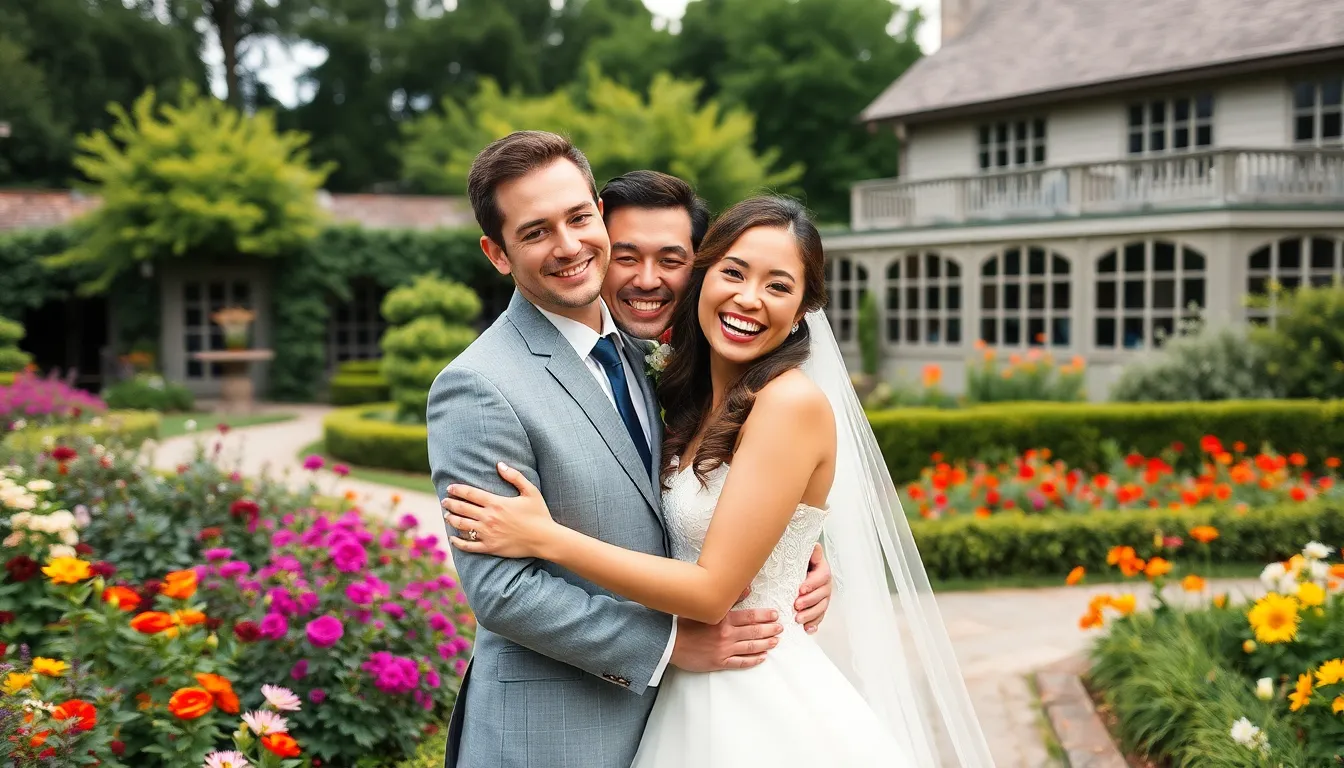
Contemporary couples are embracing fresh approaches to wedding invitation wording that reflect their personalities while maintaining the celebration’s significance. We’ll explore versatile options that balance modern style with meaningful sentiment.
Casual and Relaxed Invitation Language
Relaxed wedding invitations create an immediate sense of warmth and approachability for your guests. These informal styles work exceptionally well for outdoor celebrations, backyard gatherings, or intimate ceremonies where you want everyone to feel completely at ease.
Simple and Direct Approaches:
- Jessica and Jane are getting hitched! [location] [date] [time] followed by drinking and dancing
- Join us to celebrate our wedding
- Please join [couple] as we tie the knot!
- The wedding of [couple], followed by location, time, and date details
Text Message Style Invitations:
Casual invitations can resemble friendly text messages, perfect for couples who want their celebration to feel like a gathering of close friends. We recommend including essential details while maintaining that conversational tone throughout your invitation suite.
RSVP Language for Casual Invitations:
- R.S.V.P by 30th June to [couple’s address]
- Let us know if you can make it!
- Please reply by [date]
Creative Contemporary Phrasing
Creative phrasing allows couples to infuse personality into their invitations while maintaining elegance and clarity. These contemporary options work beautifully for couples who want something memorable without being overly casual.
Invitation Openers:
- The pleasure of your company
- At the marriage of their children
- Would love for you to join them
- Invite you to celebrate with them
Couple Focused Wording:
Modern invitations often feature the couple at the forefront with sleek, straightforward approaches that emphasize their partnership. Consider these examples:
- Jack Smith & Mason Kim would love to eat wedding cake with you Saturday, August 17, 2025 at 4:30 in the afternoon at [venue name and address] Reception to follow
Family Inclusive Options:
- Jack Smith & Mason Kim and their joyful parents hope you will attend their wedding Reception to follow
Non-Traditional Venue Wording
Non-traditional venues require exact wording that helps guests understand the unique setting and prepares them for your celebration style. We’ve found these approaches work particularly well for unconventional locations.
Venue Exact Language:
- Join us at [unique venue]
- At the beautiful [outdoor location]
- In the heart of [city/neighborhood]
Location Context Examples:
Providing context about your venue helps guests prepare appropriately and builds excitement for your unique celebration. Consider mentioning distinctive features like “seaside ceremony,” “rooftop celebration,” or “garden party reception” to paint a clear picture.
Practical Considerations:
Include helpful details about parking, accessibility, or weather contingencies when your venue requires additional guest preparation. This thoughtful approach ensures everyone can fully enjoy your special day.
Destination Wedding Invitation Wording Ideas for Travel Celebrations
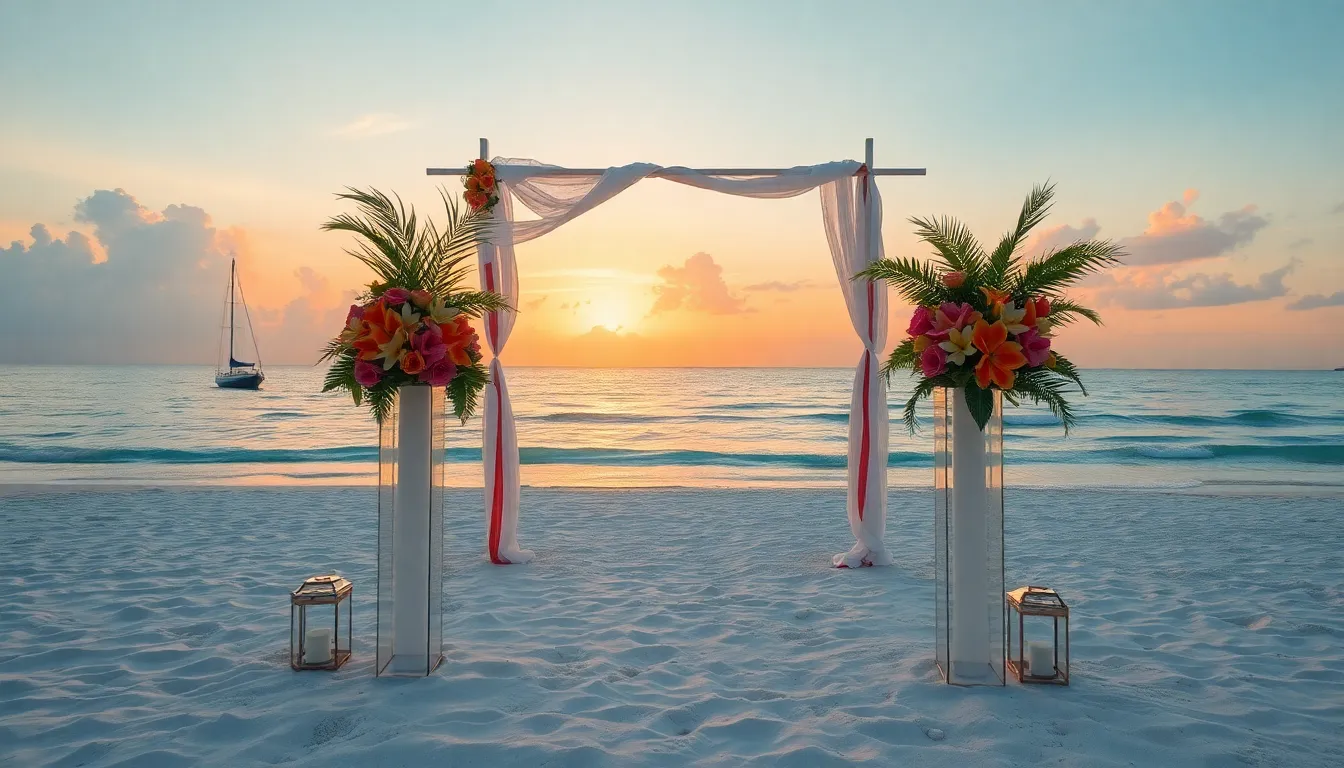
Planning a destination wedding lets you create unforgettable memories while celebrating with loved ones in extraordinary locations. We’ve gathered inspiring wording examples that capture the adventure and romance of travel celebrations.
Beach Wedding Invitation Language
Beach wedding invitations should evoke the natural beauty and relaxed atmosphere of coastal celebrations. We recommend incorporating ocean imagery and sandy shore references to set the tropical mood from the moment guests receive their invitations.
Romantic ocean themed wording:
- “With the sand beneath our feet and the sea at our backs, we’re saying ‘I do’ to a lifetime together. Please join [Couple Names] for our dream wedding on the beach at Sunset Beach Resort, Montego Bay, Jamaica, June 10th.”
- “Just like the waves of the ocean, our love has journeyed far. Join us on the shores of Portugal as we take the next step in our adventure.”
Adventure focused beach language:
- “Pack your bags and join us on an adventure of a lifetime as we tie the knot in paradise!”
- “Our search to find true love ends, our journey to cherish true love begins. Join us for our wedding on the sandy shores of Negril, Jamaica, at five o’clock in the evening, Sunday, the fifth of May, at Moon Palace Beach Resort.”
Include practical details about accommodations and travel arrangements by directing guests to your wedding website for comprehensive planning information.
Mountain or Outdoor Venue Wording
Mountain and outdoor venue invitations should reflect the majestic natural surroundings while emphasizing the celebration’s intimate connection with nature. We suggest highlighting the breathtaking landscapes that will serve as your ceremony backdrop.
Nature inspired mountain wording:
- “Celebrate love amidst the breathtaking beauty of the Swiss Alps! Together with our families, we request the honor of your presence as we exchange vows surrounded by nature.”
- “Join us for a wedding among the peaks, where sky and land unite in celebration of our love.”
Outdoor adventure language:
- “We’ve traveled the industry together, and now we invite you to join us on our greatest adventure yet!”
- “Surrounded by towering mountains and endless skies, we’ll begin our next chapter together.”
Consider mentioning exact outdoor elements like hiking trails, scenic overlooks, or garden settings to help guests visualize the unique ceremony location.
International Destination Phrasing
International destination wedding invitations require elegant language that captures the cultural richness and romantic appeal of foreign locations. We focus on incorporating destination exact elements that transport guests mentally to these exotic settings.
European destination elegance:
- “Experience the magic of love in the heart of Paris, the City of Lights! [Couple Names] invite you to witness their wedding ceremony in France.”
- “Underneath the open skies and surrounded by Venice’s beauty, Camila and John invite you to their bohemian celebration of love on the 16th of July at The Gritti Palace.”
Worldwide adventure invitations:
- “From bustling markets to ancient temples, we’ve explored the industry together. Now join us in [Destination] as we celebrate our love story’s next chapter.”
- “Love knows no borders, and neither does our celebration. Pack your passport for an unforgettable wedding weekend in [International Location].”
Remember to include visa requirements, currency information, and local customs details on your wedding website to help international guests prepare for their travel experience.
Religious Wedding Invitation Wording Ideas for Faith-Based Ceremonies
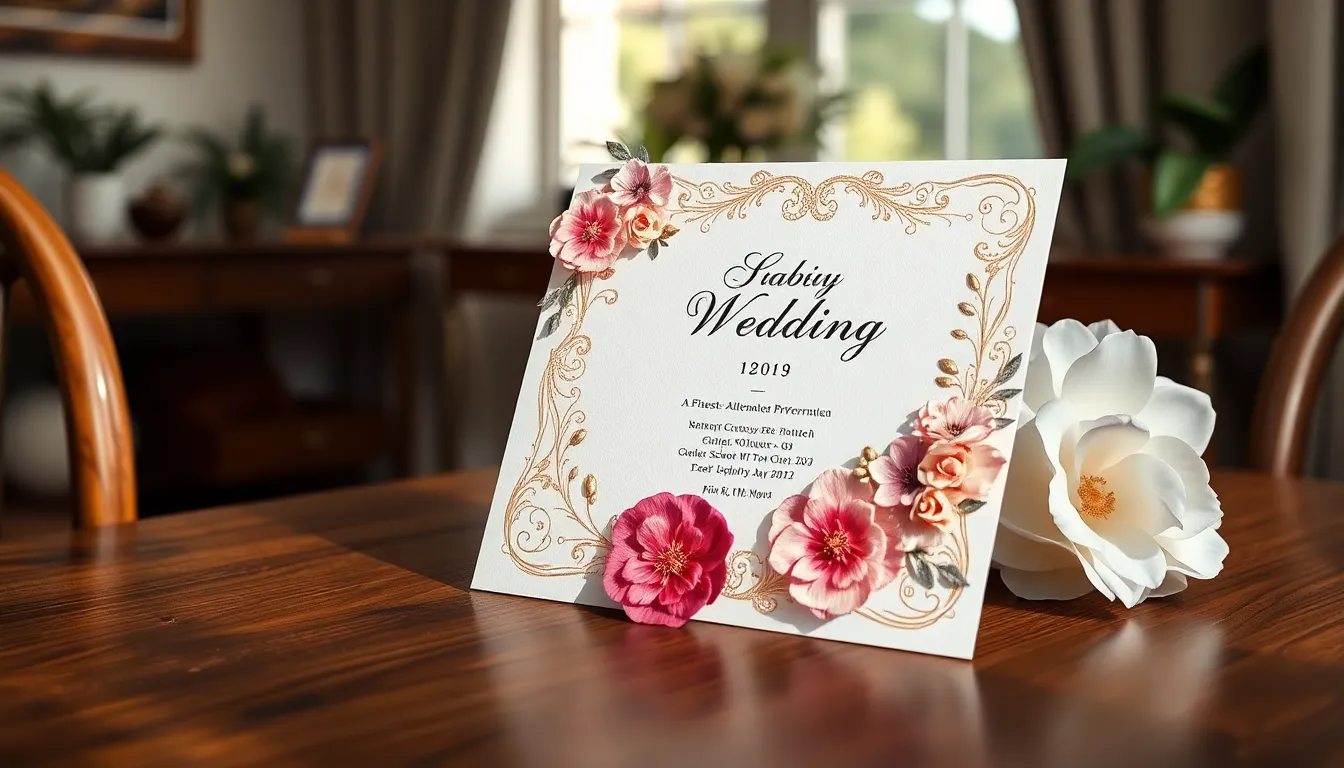
Religious ceremonies deserve invitation wording that honors the sacred nature of your union while reflecting your spiritual traditions. We’ve compiled respectful language options that celebrate your faith journey together.
Christian Wedding Invitation Wording
Traditional Christian wording captures the blessed nature of your union through scripture-inspired language. We recommend phrases like “Blessed be the tie that binds our hearts in Christian love” to open your invitation with spiritual significance. Classic Christian invitations often include references to becoming “united as one in Christ” to emphasize the sacred covenant you’re entering.
Formal Catholic ceremony invitations require exact religious terminology that honors the sacrament. We suggest wording such as “request the honor of your presence at their sacrament of holy matrimony” to properly acknowledge the Catholic tradition. Parents typically host these invitations with phrases like “Mr. and Mrs. [Parent’s Names] request the honour of your presence at the ceremony in which their daughter will vow their lives to one another.”
Protestant denominations often prefer simpler Christian language that focuses on God’s blessing. We find that phrases emphasizing “witnessing the uniting of our lives as one” work beautifully for Baptist, Methodist, and Presbyterian ceremonies. Couples can include Bible verses or references to their church community to personalize the invitation further.
Jewish Wedding Invitation Language
Hebrew and English combinations create beautiful bilingual invitations that honor Jewish traditions. We recommend including “Mazel Tov” followed by the couple’s Hebrew names and their parents’ names to maintain cultural authenticity. Traditional Jewish invitations feature the bride as “daughter of” and groom as “son of” to acknowledge family lineage.
Orthodox Jewish ceremonies require exact religious language that reflects the gravity of the commitment. We suggest phrases like “request the honor of your presence at their wedding celebration” while including references to the chuppah ceremony. Hebrew blessings or quotes from Jewish texts add meaningful spiritual elements to your invitation.
Conservative and Reform Jewish weddings allow more flexibility in language while maintaining Jewish identity. We find that couples often blend traditional Hebrew phrases with contemporary English wording. References to “celebrating their union under the chuppah” or “joining in the simcha” connect guests to the joyous nature of Jewish celebrations.
Multi-Faith Ceremony Wording
Interfaith ceremonies require delicate language that honors both religious traditions without favoring one over another. We recommend focusing on the couple’s “shared journey of love and commitment” rather than exact religious terminology. Phrases like “celebrating the union that honors their diverse backgrounds” acknowledge both faiths respectfully.
Unity-focused wording emphasizes the couple’s bond rather than denominational differences. We suggest language such as “join us as we celebrate love that transcends boundaries” to create inclusive messaging. Couples can reference their “journey of faith together” without specifying particular religious practices.
Blended tradition invitations can incorporate elements from both faiths through carefully chosen phrases. We find that mentioning “ceremony honoring their spiritual heritage” allows flexibility for various religious elements. Including both families’ names and backgrounds helps guests understand the diverse celebration they’ll witness.
Informal Wedding Invitation Wording Ideas for Relaxed Celebrations
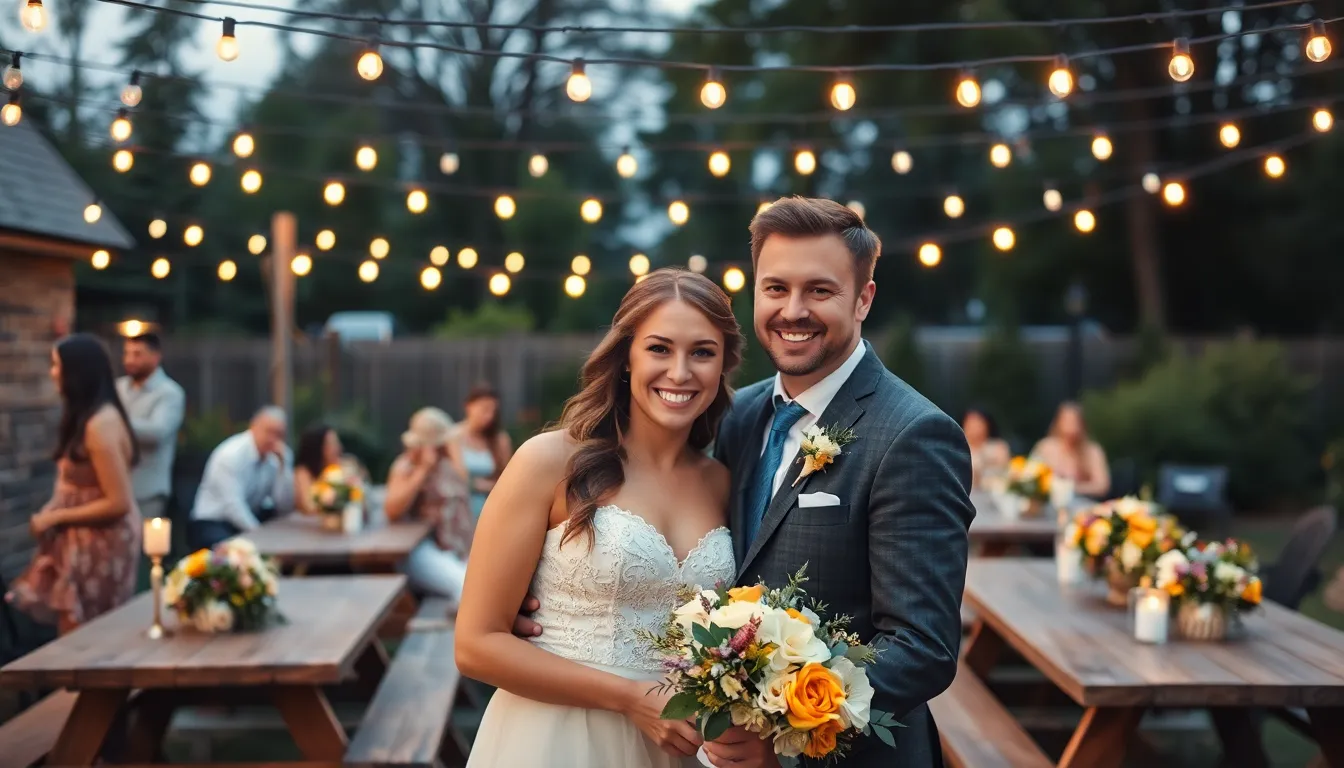
Informal wedding invitations give you the freedom to express your personality while creating a warm, welcoming atmosphere for your guests. These casual approaches work beautifully for intimate celebrations where comfort and joy take center stage.
Backyard Wedding Invitation Language
Create warmth from the start with inviting phrases like “Join us for a backyard BBQ and celebration of love!” that immediately set expectations for a relaxed gathering. Your opening statement should capture the laid-back atmosphere you’re planning.
Keep location details simple by stating “At our home, [Address], on [Date] at [Time]” rather than formal venue descriptions. This straightforward approach helps guests understand they’re joining you in your personal space.
Include reception details naturally with phrases like “Food, drinks, and dancing to follow immediately after the ceremony.” Guests appreciate knowing what to expect without lengthy explanations.
Casual Reception Wording
Focus on the fun elements by using activity-based language such as “Join us for food, drinks, and dancing under the stars!” that highlights what guests will enjoy. This approach creates excitement about the celebration itself.
Simplify your RSVP requests with casual phrasing like “RSVP by [Date], we can’t wait to celebrate with you!” instead of formal response requirements. Your enthusiasm comes through in the language you choose.
Use playful opening statements such as “Megan and Dan are tying the knot and it’s time to eat, drink, and be married!” or “We’re tying the knot and you’re invited to join the fun!” These phrases immediately establish a lighthearted tone.
Family-Style Celebration Phrasing
Emphasize family inclusion with warm invitations like “Join our family for a day of love and celebration!” that make guests feel welcomed into your extended family circle. This language creates immediate connection and belonging.
Add personal touches by including statements such as “We’re thrilled to share this special day with you and your family.” These heartfelt additions show how much their presence means to you.
Use abbreviated names like “Erin and Jacob” or initials for a modern, approachable feel that matches your relaxed celebration style. Simple date formats such as “Saturday, June 26th” or “July 12 at 5 PM” maintain the casual atmosphere throughout your invitation.
Unique Wedding Invitation Wording Ideas for Creative Couples
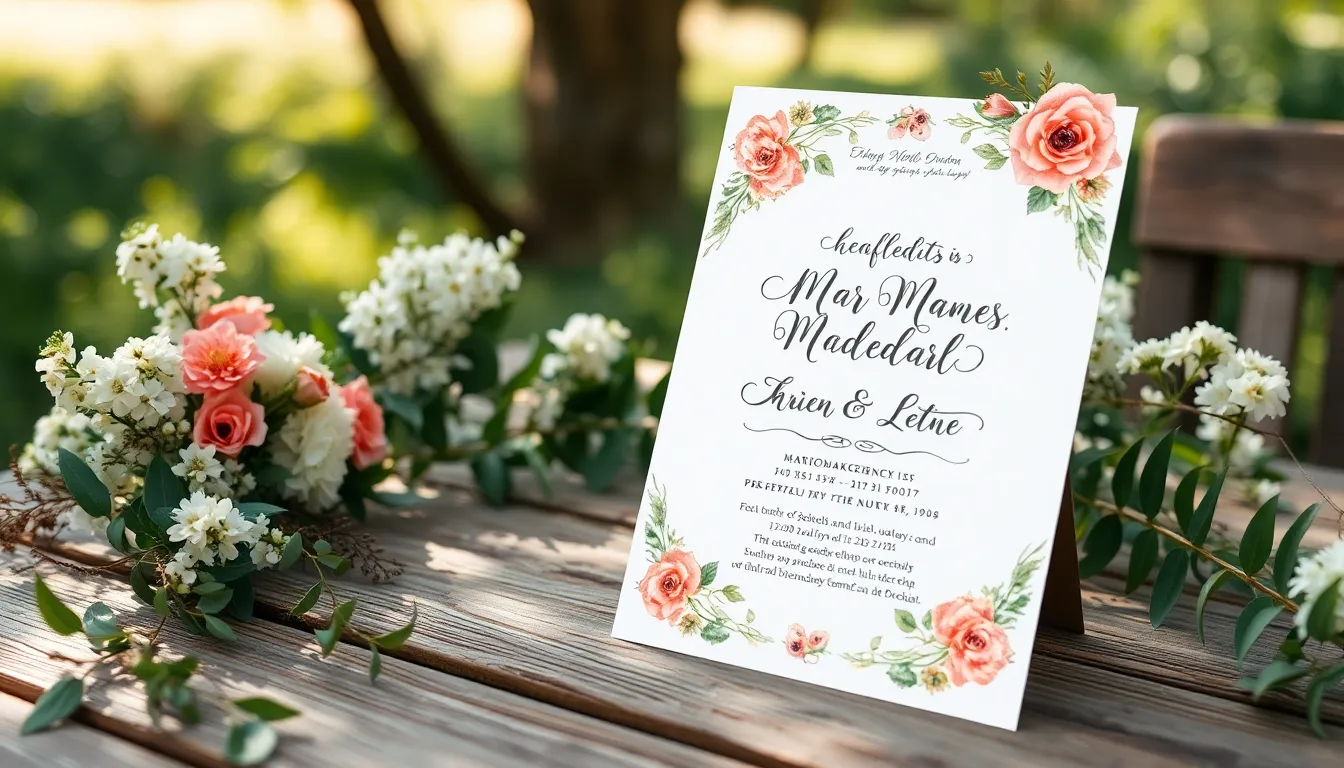
Creative couples deserve invitations that truly reflect their personalities and love stories. We’ve curated these distinctive approaches to help you create memorable wedding invitations that stand out from traditional formats.
Themed Wedding Invitation Language
Vintage Romance invitations transport guests to a bygone era with elegant phrasing like “Join us for an evening of enchantment as [Bride’s Name] and [Groom’s Name] exchange vows on [Date].” This approach creates atmosphere through sophisticated language that evokes classic Hollywood glamour and timeless love stories.
Rustic Charm themes work perfectly for outdoor celebrations, using nature imagery such as “As the trees burst into color, we pledge our love and invite you to join us on [Date] at [Location].” Seasonal references like autumn leaves, spring blooms, or harvest moons enhance the organic feel of barn weddings and countryside venues.
Beach Wedding invitations capture coastal magic with playful phrases like “Sandy toes and sun-kissed noses, join us for a beachside celebration on [Date] at [Location].” Ocean metaphors, nautical elements, and sunset imagery create the perfect foundation for seaside ceremonies and waterfront receptions.
Playful and Humorous Wording
Food and Party Focus invitations bring levity to formal announcements with phrases like “Come for the food and booze, stay for the wedding vows.” This approach works brilliantly for couples who prioritize celebration and want guests to know they’re planning an unforgettable party atmosphere.
Casual Invitation language breaks traditional barriers with direct statements such as “It’s time to party. [Bride’s Name] and [Groom’s Name] are getting married on [Date] at [Location].” Simple wording eliminates formality while maintaining excitement and creating anticipation for a relaxed celebration.
Puns and Wordplay add personality through clever language like “Love is in the air. We make a great pair!” These lighthearted approaches work especially well for couples known for their sense of humor and create memorable invitations that guests will smile about long after receiving them.
Personalized Story-Based Invitations
Special Location wording connects your venue to your love story with phrases like “In the place where we first met, [Bride’s Name] and [Groom’s Name] invite you to celebrate their union on [Date].” This approach transforms ordinary venues into meaningful spaces that honor your relationship’s unique journey.
Personal Journey invitations chronicle your relationship evolution through language such as “From our first date to our forever, join us as we embark on this new chapter on [Date].” These invitations become keepsakes that capture exact moments, shared experiences, and the progression of your love story.
Family Integration options include references to blended families, adoption stories, or multi-generational celebrations that honor everyone’s role in your journey. Personal touches like inside jokes, shared hobbies, or meaningful quotes create invitations that truly represent your unique bond and the community you’ve built together.
Second Wedding Invitation Wording Ideas for Encore Celebrations
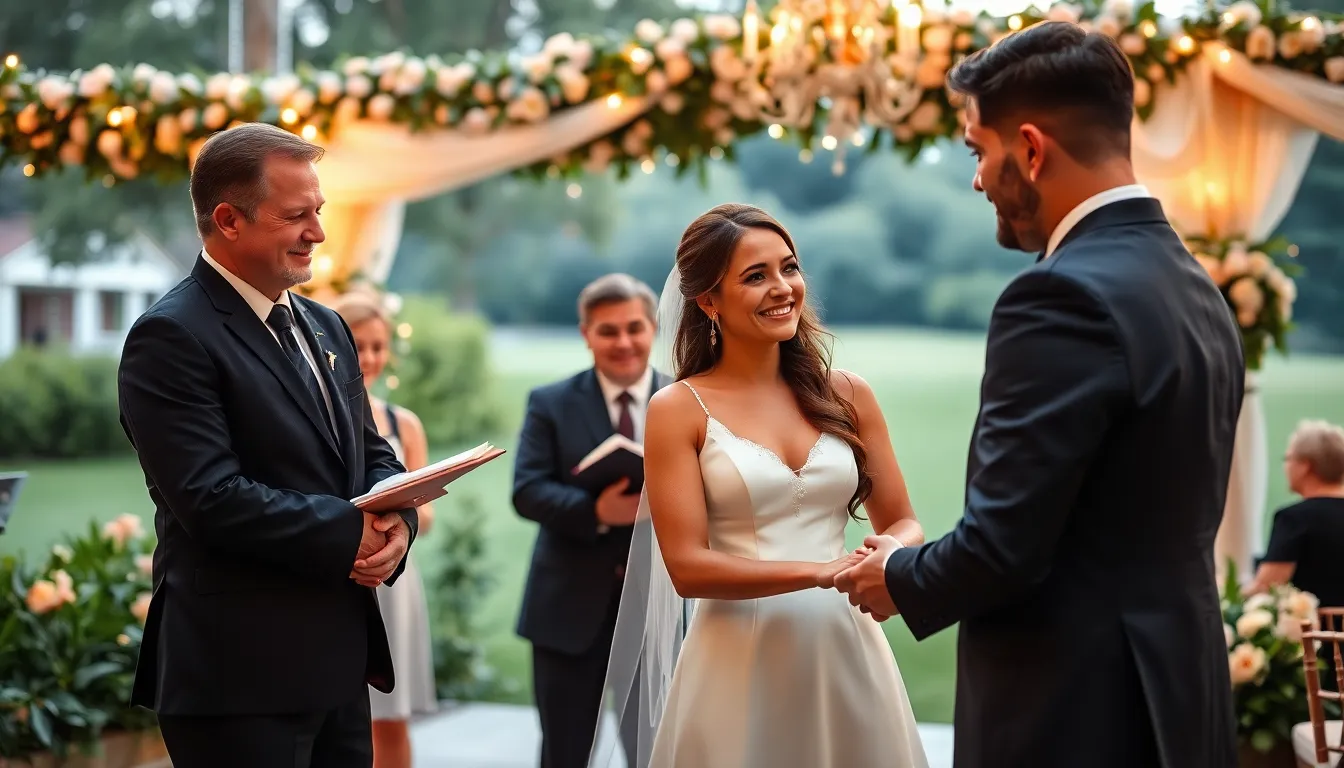
Second weddings deserve wording that reflects the couple’s journey and celebrates their new beginning with grace and authenticity. These encore celebrations offer unique opportunities to express mature love while honoring blended families and intimate gatherings.
Mature Couple Invitation Language
Simple approaches work beautifully for couples who prefer understated elegance. “Join us for a joyful celebration of our love” captures the essence without unnecessary formality while maintaining warmth and sincerity.
Romantic expressions acknowledge the shared history guests have with the couple. “Because you have shared in our lives by your friendship and love, Emma Moline and James Goettl request the pleasure of your company at their wedding celebration” creates an intimate connection that honors existing relationships.
Direct invitations eliminate complex protocols while maintaining respect. “Anne Smith and John Preston request the honor of your presence at their marriage on the 10th of December at four in the afternoon at 10 Galloway Road, Astoria, New York” provides formal structure without overwhelming detail.
Celebratory language emphasizes joy over ceremony logistics. “Please join us as we celebrate our new life together on Friday, the 11th of December at four in the afternoon at 10 Galloway Road, Astoria, New York” focuses on the couple’s future while inviting guests to share in their happiness.
Blended Family Wedding Wording
Family unity wording emphasizes the joining of established households. “Together with their families, Emma and James invite you to join them as they exchange vows” acknowledges existing children and relatives while centering the couple’s commitment.
Traditional family inclusion honors both sets of parents in established formats. “Mr. and Mrs. John Moline and Mr. and Mrs. William Goettl request the honor of your presence at the marriage of their children” provides familiar structure while respecting family dynamics.
Children acknowledgment can be woven into invitation text when appropriate. “Along with their children, Sarah and Michael invite you to witness their union” celebrates the expanding family unit while maintaining focus on the marriage ceremony.
Extended family recognition works well for large blended families. “The families of Emma Moline and James Goettl joyfully invite you to celebrate their wedding” encompasses stepchildren, grandchildren, and other relatives without lengthy individual mentions.
Intimate Second Wedding Phrasing
Private celebration language sets expectations for smaller guest lists. “We invite you to join us for a private celebration of our love” communicates exclusivity while expressing gratitude for the guest’s special place in the couple’s life.
Destination follow up wording works perfectly for couples who eloped first. “We said ‘I do’ with our toes in the sand in [Destination] Now let’s keep the party going at our hometown hangout on [Date] at [Location]” brings playful energy while including local friends and family.
Casual intimate phrasing removes formality barriers for close gatherings. “Come celebrate with us as we make it official” creates relaxed expectations while honoring the significance of the commitment ceremony.
Personal storytelling connects the invitation to the couple’s unique journey. “After finding love again, we want to share our joy with the people who matter most” acknowledges their path while emphasizing gratitude for supportive relationships.
Same-Sex Wedding Invitation Wording Ideas for LGBTQ+ Couples
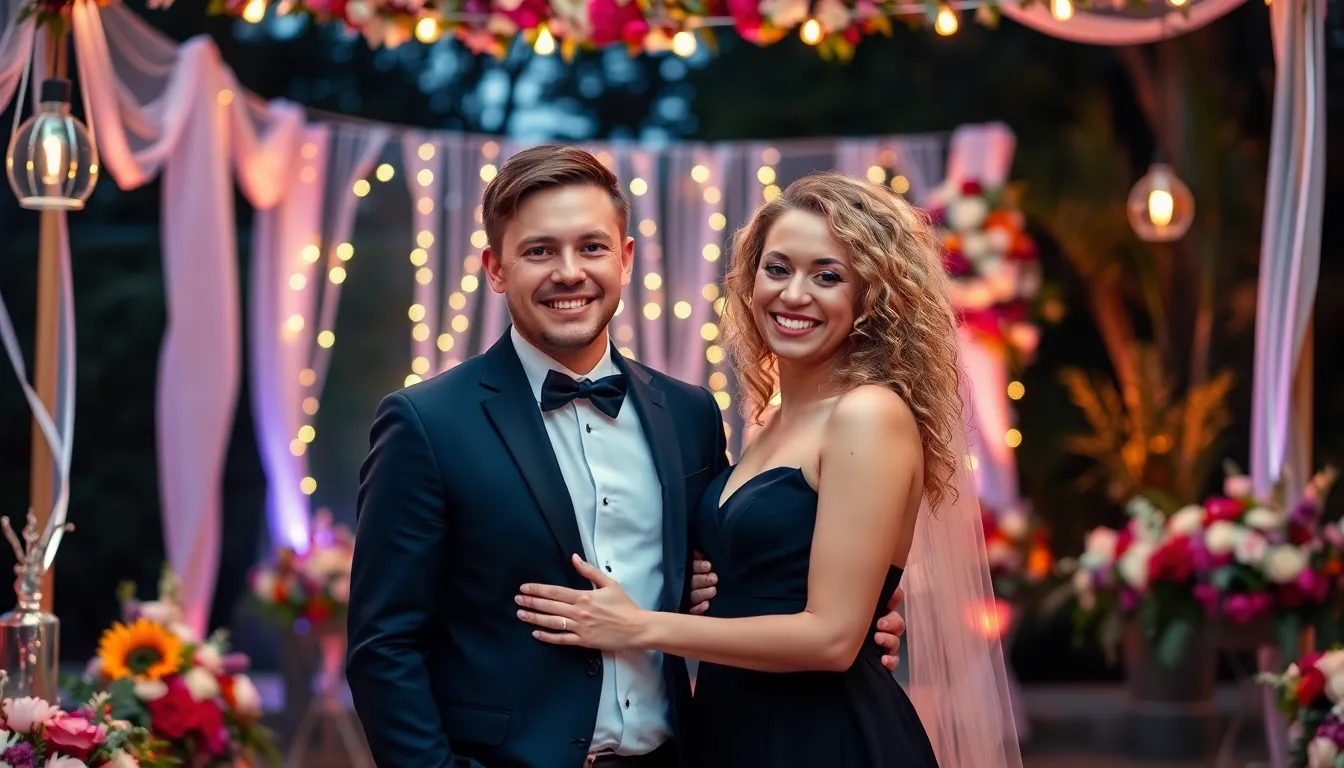
Creating beautiful wedding invitations for LGBTQ+ couples requires thoughtful language that celebrates love authentically. We’ve compiled inclusive wording options that honor your unique relationship while maintaining the elegance you deserve.
Gender-Neutral Invitation Language
Neutral language eliminates assumptions about traditional gender roles and creates welcoming invitations for all couples. We recommend using “Together with their families” instead of specifying mother and father roles, which allows both partners to be represented equally.
Consider these versatile phrases that work beautifully for any couple:
- “Taylor and Ash invite you to share in a celebration of their love”
- “Anne, child of Ted and Marie, and Alex, child of Jen and Nick, request the honor of your presence on their wedding day”
- “Carlo + David. Please Join Us at Our Wedding”
Focus on unity rather than individual roles by using phrases like “invite you to join them” or “request your presence as they unite in marriage.” These options emphasize the partnership without defaulting to gendered expectations.
Skip traditional parent hosting language when it doesn’t fit your family structure. Modern couples often choose wording that reflects their independence while still honoring family relationships through inclusive phrasing.
Inclusive Wedding Wording Options
Flexible wording reflects your personal style without conforming to outdated traditions that may not represent your relationship. We suggest celebrating diverse family dynamics through language that acknowledges all types of loving relationships.
Embrace celebration focused phrases that highlight your love story:
- “We, Nathan and James, invite you to witness our love as we exchange vows”
- “Because you’ve shared in our lives and love, we, Alison and Jane, invite you to share in the beginning of our new life together”
Choose relaxed and fun language for informal celebrations that match your personality:
- “Damon and Cooper are gettin’ hitched!”
- “Come watch Max and Marlowe get equally wed!”
- “Holy shit, we’re getting married. | Clark & Pat”
Include family integration options that honor blended families, chosen families, or non traditional support systems. Phrases like “surrounded by family and friends” work well when biological family structures vary.
Pride-Themed Celebration Phrasing
Pride elements can enhance your invitation design while keeping the wording inclusive and welcoming for all guests. We recommend incorporating vibrant colors or symbolic elements into your visual design rather than explicit pride language in the text.
Celebration language should remain universally appealing while subtly acknowledging your LGBTQ+ identity through design choices. Rainbow elements, meaningful symbols, or colorful typography can convey pride without overwhelming the invitation’s primary message.
Consider venue exact wording that highlights LGBTQ+ friendly locations or meaningful spaces in your community. Mentioning a pride center, inclusive church, or supportive venue can communicate your values without explicit statements.
Balance authenticity with accessibility by ensuring your invitation welcomes all guests while honoring your identity. Pride themes work best when integrated naturally into the overall design aesthetic rather than dominating the invitation text.
Wedding Invitation Wording Ideas for Different Host Scenarios
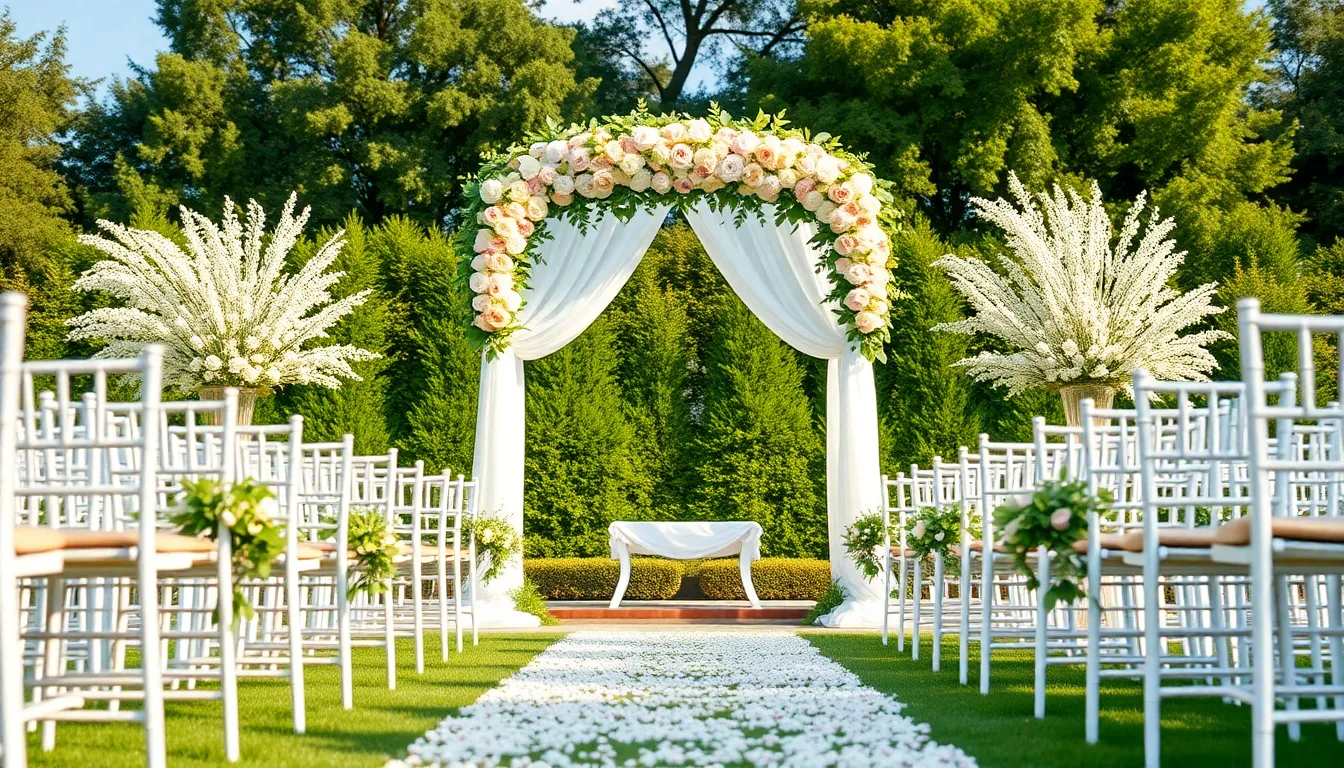
Determining who hosts your wedding influences the invitation language significantly. Different hosting arrangements require exact wording approaches to ensure clarity and proper etiquette.
Parents Hosting Wedding Language
Traditional weddings often feature parents as hosts, requiring formal language that honors family involvement. Classic formal wording follows this structure: “Mr. and Mrs. Jones request the honor of your presence at the marriage of their daughter, Sophie Marie, to John James Anderson, son of Mr. and Mrs. Anderson.”
Joint family hosting creates an elegant approach when both sets of parents contribute equally. Both families can present a united front with language like: “Mr. and Mrs. Jones and Mr. and Mrs. Anderson request the pleasure of your company at the marriage of their children.”
Formal parent-hosted invitations maintain dignity while clearly establishing family connections. Religious ceremonies benefit from “honor of your presence” language, while secular celebrations use “pleasure of your company” phrasing.
Couple Hosting Their Own Wedding
Modern couples frequently host their own celebrations, allowing for personalized invitation language. Contemporary wording reflects independence while acknowledging family support: “Together with their families, Sophie Marie Taylor and John James Anderson invite you to celebrate their wedding.”
Casual couple-hosted invitations embrace simplicity and directness. Relaxed language creates warmth: “Abigail Jane Smith and Henry James Mullen invite you to celebrate their marriage on Saturday, the Eleventh of June, Two Thousand and Eighteen.”
Self-hosted celebrations provide flexibility in tone selection, from formal elegance to casual charm. Couples can emphasize their partnership while maintaining proper invitation structure and essential details.
Multiple Host Wording Options
Complex hosting arrangements require thoughtful language that acknowledges all contributors fairly. Joint hosting by families and couples creates comprehensive wording: “Mr. and Mrs. Jones, Mr. and Mrs. Anderson, and Sophie Marie Taylor and John James Anderson request the pleasure of your company at their wedding celebration.”
Alternative family hosts, such as relatives or close friends, deserve recognition in invitation language. Substitute hosting acknowledges special relationships: “Mr. and Mrs. Jones, aunt and uncle of the bride, and Mr. and Mrs. Smith, friends of the groom, invite you to join them for their wedding.”
Multiple host scenarios benefit from clear hierarchy establishment, ensuring important relationships receive appropriate recognition. Balanced language prevents confusion while honoring everyone’s contribution to the celebration.
Wedding Invitation Wording Ideas for Special Circumstances
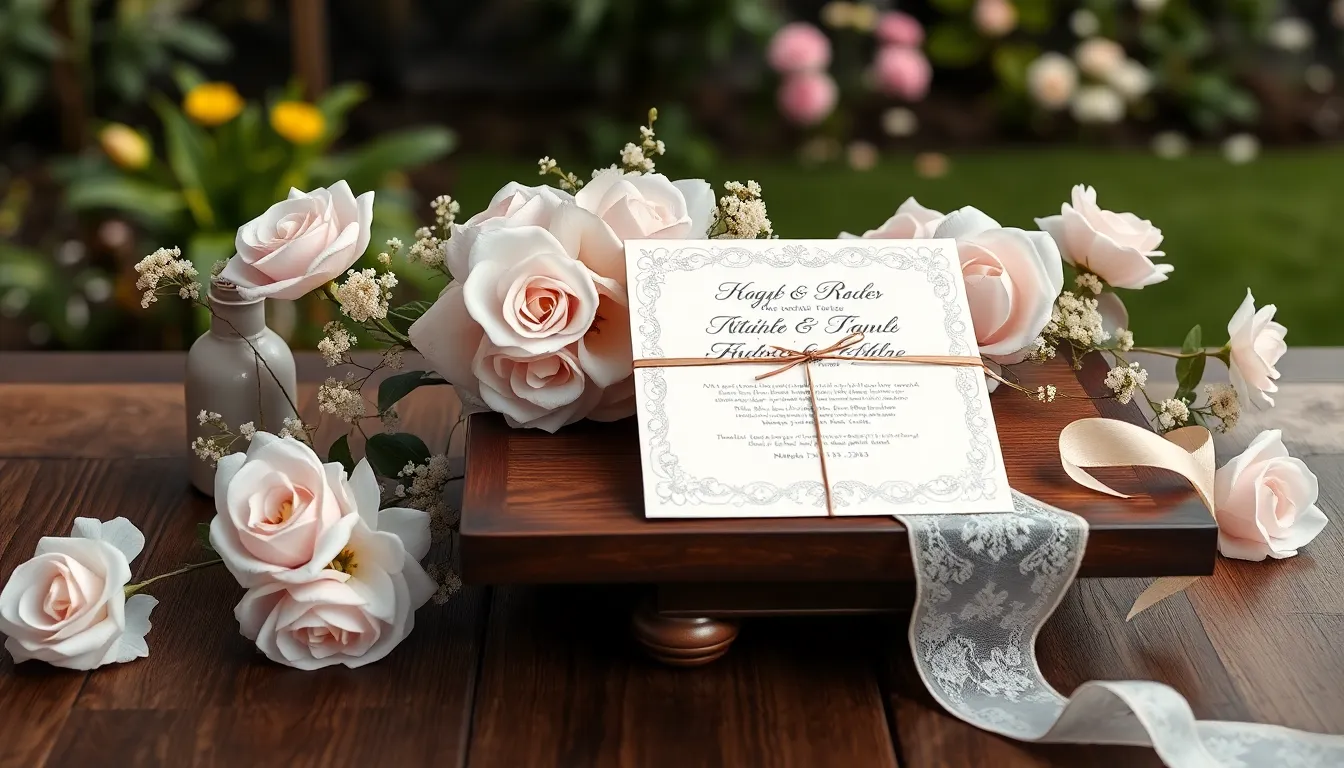
Life’s unexpected moments often require thoughtful adjustments to wedding invitation wording. These special circumstances demand language that maintains grace while addressing unique situations.
Postponed Wedding Announcement Language
Postponed weddings require clear communication that acknowledges the change while maintaining excitement for the celebration. Your announcement should express regret for any inconvenience while emphasizing your continued enthusiasm.
Formal postponement language includes phrases like “After careful consideration, we regret to inform you that our wedding, originally scheduled for [Original Date], has been postponed to [New Date].” This approach maintains dignity while providing essential information.
Understanding postponement wording helps guests process the change gracefully. We recommend adding “We appreciate your understanding and look forward to celebrating with you then” to reinforce your commitment to including them.
Compassionate rescheduling phrases acknowledge the disappointment: “Due to unforeseen circumstances, we are rescheduling our wedding from [Original Date] to [New Date]. Your presence remains important to us as we begin this new chapter.”
Memorial Tribute Wording
Memorial tributes honor loved ones while celebrating your union, creating meaningful connections between past and present. These phrases acknowledge absence while emphasizing continued love and influence.
Loving memory language begins with “In loving memory of [Person’s Name], we invite you to join us as we celebrate the union of [Bride’s Name] and [Groom’s Name].” This wording creates a bridge between remembrance and celebration.
Legacy continuation phrases emphasize ongoing influence: “As we begin our new life together, we remember [Person’s Name], whose love and legacy continue to inspire us.” These words honor the deceased while focusing on your future.
Spiritual connection wording might include “With [Person’s Name] watching over us, we joyfully invite you to witness our marriage.” This language provides comfort while maintaining celebration focus.
Small Guest List Intimate Wording
Intimate weddings require language that emphasizes the special nature of small gatherings while making guests feel uniquely valued. Your wording should convey exclusivity as an honor rather than limitation.
Exclusive celebration language uses phrases like “You are cordially invited to join us for an intimate celebration of our love and commitment to each other.” This approach makes guests feel specially chosen.
Private ceremony wording includes “We would be honored if you could join us for a small, private ceremony to mark the beginning of our new life together.” The emphasis on honor elevates the invitation’s significance.
Close circle phrasing might state “Among our closest family and friends, we invite you to witness our marriage in an intimate setting.” This language reinforces the guest’s importance to your relationship.
Personal connection emphasis can include “As someone dear to our hearts, we invite you to share in our quiet celebration of love.” These words acknowledge the personal relationship while setting expectations for the event’s scale.
Conclusion
Your wedding invitation serves as the first glimpse your guests will have of your special day so choosing the right words matters immensely. We’ve explored dozens of wording options that cater to every couple’s unique style from traditional elegance to modern creativity.
Remember that the best invitation wording authentically reflects who you are as a couple while providing guests with all the essential details they need. Whether you’re planning a formal church ceremony or an intimate backyard celebration the perfect words are waiting to tell your love story.
Take time to consider your venue family dynamics and personal preferences as you create your invitations. With these comprehensive wording ideas as your guide you’ll create invitations that set the perfect tone for your unforgettable celebration.
Frequently Asked Questions
What are the key elements of traditional wedding invitation wording?
Traditional wedding invitation wording includes the hosts’ names, request for attendance, couple’s names, ceremony date and time, venue location, and reception details. Formal language like “request the honour of your presence” for religious ceremonies and “request the pleasure of your company” for receptions maintains elegant sophistication while conveying essential information clearly.
How should modern couples approach casual wedding invitation wording?
Modern couples can use relaxed, conversational language that reflects their personalities while maintaining the celebration’s significance. Simple phrases like “We’re getting married!” or “Join us for good food, great music, and lots of dancing” create warmth and approachability, perfect for outdoor venues or intimate gatherings.
What wording works best for destination wedding invitations?
Destination wedding invitations should capture adventure and romance while providing practical information. Use phrases like “Join us under the sun” for beach weddings or “Celebrate with us in the mountains” for outdoor venues. Include travel details on your wedding website and emphasize the unique cultural experience guests will enjoy.
How do you word religious wedding invitations respectfully?
Religious wedding invitations require appropriate terminology that honors spiritual traditions. For Christian ceremonies, use “request the honour of your presence” and include phrases like “in holy matrimony.” Jewish invitations might incorporate Hebrew phrases, while interfaith ceremonies should use inclusive language that respects both traditions without compromising either faith’s integrity.
What’s the best approach for second wedding invitation wording?
Second wedding invitations should reflect maturity and new beginnings while acknowledging the couple’s journey. Use elegant, warm language that focuses on celebration rather than formality. Include blended family considerations and personal touches that connect to your unique story, emphasizing the joy of this new chapter together.
How should same-sex couples word their wedding invitations?
Same-sex wedding invitations should use inclusive, gender-neutral language that authentically celebrates love. Focus on unity with phrases like “two hearts becoming one” and avoid assumptions about traditional roles. Ensure the wording reflects your relationship dynamics while maintaining elegance and welcoming all guests to your celebration.
What are common mistakes to avoid in wedding invitation wording?
Common mistakes include unclear hosting arrangements, missing essential details like dress code or venue directions, inconsistent formality levels throughout the invitation suite, and forgetting to include RSVP deadlines. Always proofread for spelling errors and ensure the tone matches your wedding style consistently across all components.
How do you handle complex family situations in invitation wording?
Complex family situations require balanced, diplomatic wording that acknowledges all contributors fairly. For divorced parents, list them separately. Include stepparents when appropriate, and consider neutral hosting language like “Together with their families” when multiple parties are involved. Focus on unity while respecting individual relationships and contributions.

